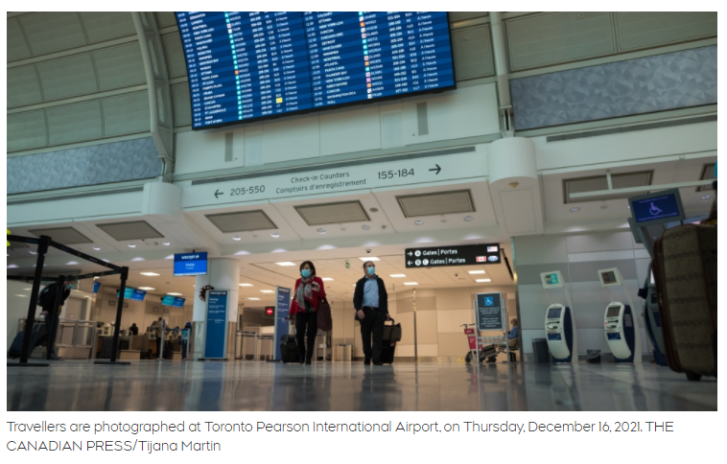TORONTO — Eased COVID-19 restrictions at the border took effect on Monday, with fully vaccinated travellers no longer needing an expensive pre-arrival PCR test result to enter Canada.
Restrictions at the border were tightened in December, as the Omicron variant led to an explosion of COVID-19 cases and hospitalizations. However, with declining cases and hospitalizations, the federal government announced on Feb. 15 that it would be lifting its travel advisory against all non-essential international travel and loosening some restrictions at the border.

Here’s what you need to know about the new rules for travellers:
ANTIGEN TESTS NOW ACCEPTED
Previously, all travellers, regardless of vaccination status, have had to present a negative PCR test result taken within 72 hours of their scheduled flight or land entry into Canada.
Now, fully vaccinated travellers have the option to instead show proof of an antigen test taken a day before the scheduled flight or arrival at a land border crossing.
Compared to PCR tests, which can often cost upwards of $200, antigen tests are less expensive and have a quicker turnaround time.
However, the antigen test must be administered by a laboratory, health care entity or telehealth service. At-home rapid antigen tests cannot be used to enter Canada.
These pre-arrival testing rules are similar to the U.S. which also accepts antigen test results for travellers flying into the country. However, unlike Canada, travellers entering the U.S. through the land border aren’t required to show any COVID-19 test result.
LOOSENED RULES FOR ON-ARRIVAL TESTING, CHILDREN UNDER 12
Prior to the new rules, travellers who had been outside of Canada or the U.S. have had to complete another COVID-19 test upon entry into Canada. Travellers were also required to quarantine until they received a negative result.
As of Feb. 28, fully vaccinated travellers will only be required to take an on-arrival test if they become randomly selected to do so. In addition, fully vaccinated travellers won’t need to quarantine while waiting for their test results.
The new rules also mean that unvaccinated children under 12 travelling with fully vaccinated parents or guardians will no longer be subject to restrictions.
Previously, unvaccinated children have had to complete an on-arrival COVID-19 test and another test on day 8. Unvaccinated children were also required to avoid schools, camps, daycares, large gatherings and public transit for 14 days.
THINGS THAT AREN’T CHANGING
All travellers are still required to use the ArriveCAN app before entering Canada. ArriveCAN allows travellers to upload their proof of vaccination and COVID-19 test result. Travellers who don’t have a smartphone can use the web browser version of ArriveCAN on any computer.
While the general advisory against non-essential travel has been lifted, Canada continues to advise against all cruise ship travel outside of the country.
Restrictions for unvaccinated travellers aged 12 and older are not changing either. Unvaccinated travellers will still be required to take a COVID-19 test on arrival, quarantine for 14 days, and take another COVID-19 on day 8 of their quarantine. Unvaccinated foreign nationals will also continue to be denied entry into Canada unless they meet specific exemptions.
Travellers who have tested positive for COVID-19 but no longer have symptoms can return to Canada if they provide proof of a positive molecular test taken at least 10 days and no more than 180 days before their attempt to enter the country.
“There is still a real risk of becoming sick or stranded while abroad and having to extend their trip or find themselves in need of medical assistance should they test positive for COVID-19,” Health Minister Jean-Yves Duclos said on Feb. 15.
Article From: CTV news
Author: Tom Yun

